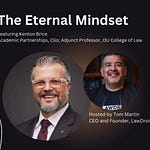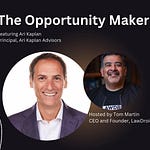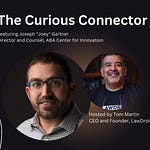Hey there Legal Rebels! 👋
I'm excited to share with you the 25th episode of the 2025 season of the LawDroid Manifesto podcast, where I continue to interview key legal innovators to learn how they do what they do.
This one was a real treat for me and I hope you enjoy it as much as I did. Professor Richard Susskind is a unique voice and influence in the world of AI and the law and an intellectual hero of mine. I gave him the title, “The AI Philosopher” because throughout the years he has helped us to see ahead and think deeply about the law and the legal profession through the lens of innovation.
If you want to understand how to think about AI beyond today's limitations and grasp the profound implications for the legal profession and society, you need to listen to this episode. Richard is, and has consistently been, at the forefront of legal technological thinking and has a unique perspective spanning four decades of AI development, from his 1980s doctorate to today's generative AI revolution.
Transforming How We Think About AI
Join me as I interview Professor Richard Susskind, Author, Professor and Adviser.
In this insightful and engaging podcast episode, Richard shares his remarkable journey from studying jurisprudence in 1980s Glasgow to becoming one of the world's foremost thinkers on AI and law. He dives deep into his new book "How to Think About AI: A Guide for the Perplexed," exploring the critical mindset shifts needed to understand AI's true potential. Richard also demonstrates how his early work with his father, a dermatologist, on developing a melanoma detection system presaged today's breakthrough medical AI applications. A heartfelt story that provides an insight into how AI has evolved.
His stories and insights underscore the importance of moving beyond current limitations to understand AI's trajectories and preparing for artificial general intelligence (AGI) within the next decade. For those who really are confounded about what AI is and how to make sense of it, Richard is the ideal guide to show us the way. This episode is a must-watch for anyone seeking to understand the philosophical and practical implications of AI for law, justice, and humanity.
The Skinny
Professor Richard Susskind, whose four-decade journey in AI and law began with a 1980s doctorate in AI and the Law, shares his profound insights on how to think about artificial intelligence beyond today's headlines and limitations.
Starting from his philosophical education in Glasgow through his groundbreaking work at Oxford, Richard shares his early collaboration with his dermatologist father on melanoma detection systems foreshadowed today's medical AI breakthroughs. Throughout the conversation, Richard emphasizes the critical importance of understanding AI's trajectories rather than fixating on current limitations, challenging listeners to prepare for artificial general intelligence (AGI) potentially arriving between 2030-2035. His new book serves as a guide for navigating the perplexing landscape of AI development, moving beyond the "not us thinking" and "AI fallacy" that prevent professionals from grasping technology's true potential. Richard's perspective combines deep philosophical grounding with practical insights, demonstrating how AI represents both the greatest opportunity and challenge for legal services, access to justice, and human civilization itself.
Key Takeaways:
Richard's journey from 1980s jurisprudence student to AI pioneer demonstrates the long arc of technological development, showing how today's generative AI builds on decades of foundational work
The "not us thinking" fallacy causes professionals to see AI's potential in other fields while believing their own profession is somehow immune to technological disruption
Technological myopia leads people to evaluate AI's future potential based solely on today's limitations, ignoring the massive investment and rapid progress occurring in the field
The “AI fallacy” assumes machines must replicate human thinking processes to achieve human-level performance, when in fact they can achieve superior outcomes through entirely different mechanisms
AGI (Artificial General Intelligence) may arrive between 2030-2035, representing the most consequential technological breakthrough in human history
Legal professionals must think beyond automation to consider innovation (new ways of delivering legal outcomes) and elimination (preventing legal problems altogether)
The purpose of law is not to provide jobs for lawyers but to serve society, making AI's potential to democratize legal access a moral imperative
Understanding AI requires moving beyond task substitution to envision fundamental transformations in how legal services are conceived and delivered
Notable Quotes:
"I remain perplexed myself, but hopefully slightly less perplexed than when I first wrote the book." - Richard Susskind (02:34-02:40)
"The AI community itself doesn't speak with a single voice about where this technology is taking us." - Richard Susskind (03:13-03:20)
"The minute I read that it had 129,000 past images of lesions, he said, I knew it was going to be better than me." - Richard Susskind, relating what his father, a medical doctor, said to him (22:58-23:00)
"There are many ways of being smart that aren't smart like us." - Richard Susskind (34:05-34:09)
"If this happens, this would be the most consequential technological breakthrough in the history of humanity." - Richard Susskind (36:47-36:53)
"The law is no more there to provide a living for lawyers than ill health is there to provide a living for doctors." - Richard Susskind (44:12-44:15)
"Patients don't want neurosurgeons, they want health." - Richard Susskind (47:31-47:31)
"Saving humanity with and from AI, I believe, is the defining challenge of our age." - Richard Susskind (53:39-53:41)
Clips
AI’s History: More Than Just A Recent Revolution
The Spark: Discovering AI and Charting a Legal Tech Path
The AI Fallacy
The Accelerating Pace of AI Progress
Richard's perspective reflects the evolution of AI thinking itself, from early rule-based expert systems that attempted to model human reasoning to today's machine learning approaches that achieve superior performance through fundamentally different mechanisms. His philosophical background in jurisprudence provides a unique lens for understanding not just how AI works, but how we should think about its implications for law and society. Richard’s disarming sense of humor and wit makes the subject both approachable and fun to read.
That’s actually one of the features I really like about Richard’s book. It is not of the moment, describing the technology of today. It won’t go stale on the shelf in a year. Richard’s book challenges our thinking about AI. And, by helping us to extricate ourselves from many a thorny misconception and misunderstanding, aids us in understanding what AI really is and what we stand to gain from it. [In particular, for the more philosophical like me, I highly recommend you read Chapter 10, Conscious Machines, wherein Richard poses the question: “are AI-based machines conscious or might they be in the future?”]
Overall, what stands out most is Richard's emphasis on moving beyond current limitations to understand technological trajectories. His framework for thinking about automation, innovation, and elimination provides legal professionals with a comprehensive way to envision AI's impact beyond simple task substitution — doing what we already do, but faster, better and cheaper. The conversation demonstrates how proper philosophical grounding can illuminate both the opportunities and challenges of transformative technology.
Closing Thoughts
As someone who's been exploring legal AI for years, I find Richard's perspective both humbling and inspiring. His four-decade journey from early AI research to today's generative AI revolution provides invaluable context for understanding where we are and where we're heading. The philosophical rigor he brings to thinking about AI offers a much-needed antidote to both the hype and the fear that often dominate discussions about artificial intelligence.
What excites me most about this conversation is Richard's challenge to think beyond today's limitations and consider AI's true trajectory. His call to prepare for AGI by 2030-2035 isn't science fiction—it's risk management for legal professionals and society. The critical question, “What if AGI?” helps to clear the technological myopia, that fastens us on the present state of things, so that we may look ahead and plan for the future. The frameworks he provides for moving beyond automation to innovation and elimination give us practical tools for envisioning a transformed legal landscape.
For our Legal Rebels community, Richard's insights serve as both a wake-up call and a roadmap. The legal profession stands at a crossroads where we can either cling to traditional methods or embrace AI's potential to democratize justice and solve the access to justice crisis. Those who approach this challenge with Richard's combination of philosophical depth and practical wisdom will be best positioned to serve both their clients and society.
As AI continues its exponential advance, the question isn't whether the legal profession will be transformed, but how quickly and how thoughtfully we'll navigate that transformation. Richard's work provides the intellectual framework we need to think clearly about these profound changes and their implications for the future of law and justice.















